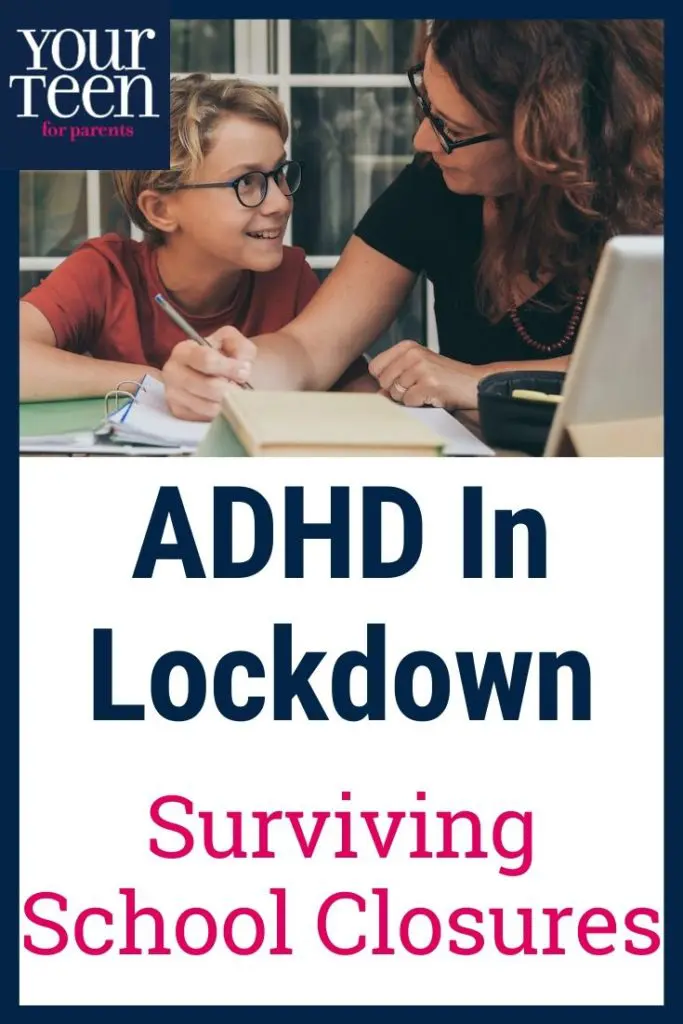School closures related to COVID-19 are the latest parenting challenge to hit the ADHD community. Suddenly having to help kids learn at home is challenging for all families, but especially for those impacted by ADHD who rely on structure, routine, and staying active for managing their tweens’ and teens’ symptoms.
| [adrotate banner=”169″] |
But instead of stressing, take some advice from an ADHD specialist and a parent who homeschools her teen with ADHD on why—and how—schooling a tween or teen with ADHD at home is totally doable—and maybe even beneficial.
4 Tips for Helping Kids with ADHD Handle Schooling at Home
1. Keep a schedule
“It is important that families attempt to do their best to maintain sleep, meal, and activity schedules as much as possible,” says Dr. Jennifer Mautone, a psychologist and assistant professor at the Children’s Hospital of Philadelphia.
School shutdowns aren’t an excuse to stay up late and sleep in. Tweens and teens should stick to their bedtime and wakeup schedule as if they were in school and follow their usual morning routine. Even though the home schedule won’t match kids’ in-school schedule exactly, families should set aside time each day for opportunities to both learn and play—ideally, outdoors.
Debora Robertson, a Pittsburgh mom who has been homeschooling her teen daughter with ADHD for 10 years, follows a weekly schedule and makes detailed to-do lists. At the same time, though, Robertson says her routine also involves “a lot of thinking outside of the box” and finding new ways to do things.
2. Rely on behavioral intervention strategies
When it comes to handling everything from online learning and homework to family conflicts, Dr. Mautone recommends parents use behavioral intervention strategies that are consistent with best practices for addressing ADHD. The goal is to increase desired behaviors and compliance while decreasing less-desirable behaviors and defiance.
Keep in mind the ABCs:
- Antecedents—what comes before a behavior
- Behavior—what the child does
- Consequences—what happens after the behavior and influences how likely it is to occur again
You can control what comes first (A) and how you react (C), but you cannot control the behavior itself (B). So set your tween or teen up for success by
- Scheduling schoolwork at times they’re most focused and least fatigued
- Removing distractions
- Getting their attention before speaking
- Giving simple, direct, and specific instructions one step at a time
- Motivating them with “when-then” statements to show that when they perform the desired behavior, then they get a consequence they want
- Deliver immediate, consistent, and fair consequences
- Plan consequences in advance
Parental attention and positive reinforcement are key—and luckily this might be easier than ever if you’re all home together.
3. Help your child stay on track and emotionally healthy
This is a stressful time for families, and because people with ADHD are also more likely to have anxiety disorders, be on the lookout for signs that it’s creeping in. If your child is anxious about COVID-19 itself, the National Association of School Psychologists offers recommendations for talking with children about the pandemic.
Changes in routine and activities, increased family time, and time apart from friends could also increase anxiety and depression, so if you have any concerns about your child’s mental health, contact their doctor. Also reach out to their prescriber if you suspect that their ADHD medication dosage needs to be adjusted.
And, since schools provide so much more than classroom learning, your child might be missing the counseling services, therapies, or specialized instruction they receive there. The U.S. Department of Education addresses students with disabilities’ access to special education services during COVID-19–related school closures.
4. Look on the bright side
Learning at home can be good for your tween or teen with ADHD—and for your whole family.
You might find that your child responds well to one-on-one instruction, like Robertson’s daughter. “[Homeschooling] provides my ADHDer a safe, flexible environment,” she says. “If something isn’t working, we can quickly change it. We can speed up or slow down as needed. She can work on problem-solving skills in real-time, real-life situations, which is super helpful for kids who struggle with executive function issues.”
Even though you’ll likely have to facilitate delivery of your school district’s curriculum rather than making your own, take this opportunity to enjoy some time to get creative as a family. Robertson recommends activities like:
- Playing a board game
- Building a squirrel feeder
- Developing an exercise workout
- Searching for new recipes online or cooking a family favorite
“Learning isn’t about filling in the blanks,” Robertson says.

No matter what happens, don’t be too hard on yourself. “Just do your best, and focus on maintaining a strong, positive relationship with your children,” Dr. Mautone advises. “That is a critical component of supporting all children’s growth and development.”






